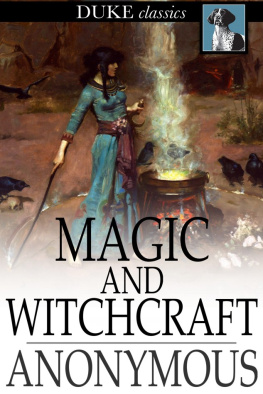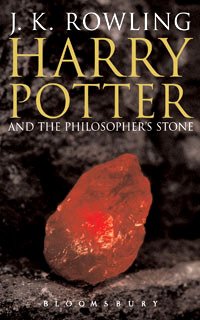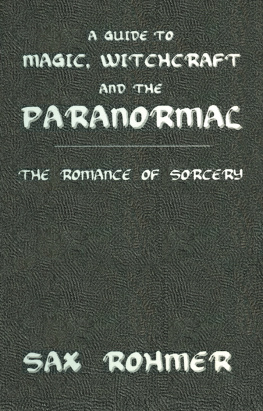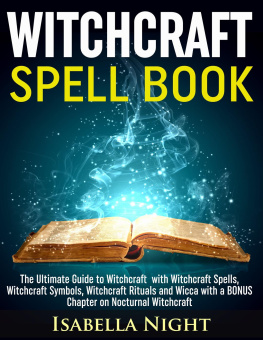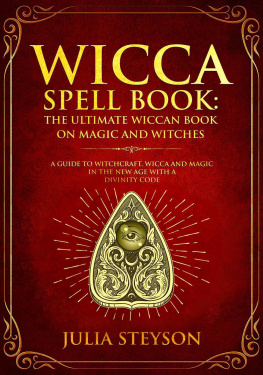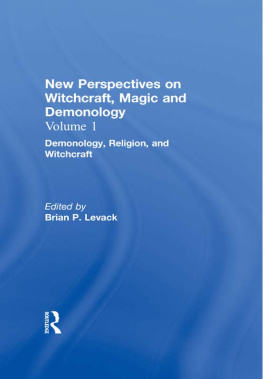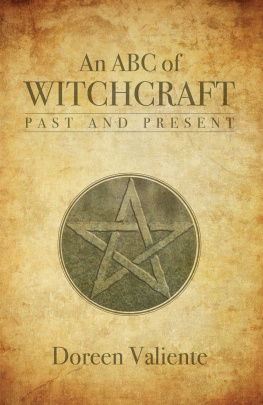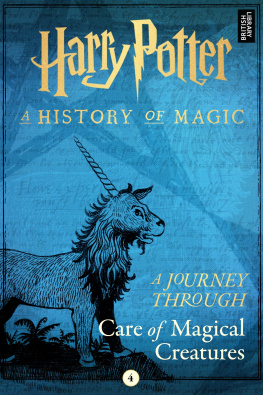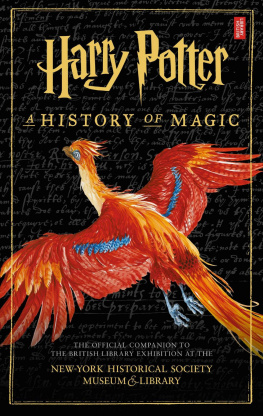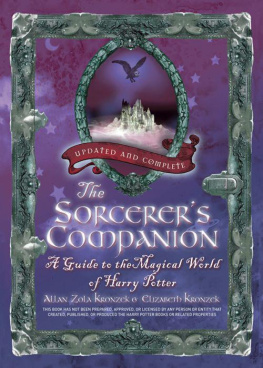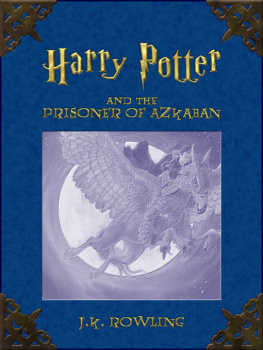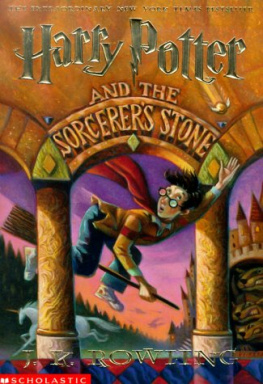MAGIC AND WITCHCRAFT
* * *
ANONYMOUS
*
Magic and Witchcraft
First published in 1852
ISBN 978-1-62013-433-7
Duke Classics
2013 Duke Classics and its licensors. All rights reserved.
While every effort has been used to ensure the accuracy and reliability of the information contained in this edition, Duke Classics does not assume liability or responsibility for any errors or omissions in this book. Duke Classics does not accept responsibility for loss suffered as a result of reliance upon the accuracy or currency of information contained in this book.
Contents
*
Preface
*
We have long wished that some English or foreign university would offer aprize for a history of Magic and Witchcraft. The records of human opinionwould contain few chapters more instructive than one which should dealcompetently with the Black Art. For gross and painful as the details ofsuperstition may be, yet superstition, by its very etymology, implies adogma or a system of practice standing upon some basis of fact or truth:and however vain or noxious the superstructure may be, the foundation ofit is in some way connected with those deep verities upon which rest alsothe roots of philosophy and religion.
For a grand error, and such alone can at any time essentially affect theopinions of mankind in general, is ever the imitation or caricature ofsome grand truth. From one soil spring originally the tree which yieldsgood fruit and the plant which distils deadly poison. The verydiscernment of the causes of error is a step towards the discovery of itsopposite. The bewilderments of the mind of man, when fully analysed,afford a clue to the course of its movements from the right track, or atleast enable us to detect the point at which began the original separationbetween Truth and Error. Alchemy led, by no very circuitous route, to thescience of chemistry; the adoption of false gods by the majority of thehuman race rendered necessary the dispensations of the Jewish andChristian schemes; and the corruption of true reverence for the Good, theBeautiful, and the Holy, was the parent of those arts, which, under theseveral appellations of Magic, Witchcraft, Sorcery, etc., drew theirprofessors at first and the multitude afterwards to put faith in the evil,the deformed, and the impure. Magic and Witchcraft are little more thanthe religious instincts of mankind, first inverted, then polluted, andfinally, like all corrupted matter, impregnated with the germs of acorrupt vitality.
So universal is the belief in spiritual influences, and more especially intheir malignant influences, that no race of men, no period of time, noregion of the globe, have been exempt from it. It meets us in the remoteantiquity of Asiatic life, in the comparatively recent barbarism of theAmerican aborigines, in the creeds of all the nations who branched offthousands of years ago eastward and westward from their Caucasian cradle,in the myths, the observances, and the dialects of nations who have noother affinity with one another than the mere form of man.
No nation, indeed, can reproach another nation with its addiction to magicwithout in an equal degree condemning itself. All the varieties of mankindhave, in this respect, erred alike at different periods of their socialexistence, and all accordingly come under the same condemnation of makingand loving a lie. The Chaldean erred when, dissatisfied with simpleobservation of the heavenly bodies through the luminous atmosphere of hisplains, he perverted astronomy into astrology: the Egyptian erred when herepresented the omnipresence of the Deity by the ubiquity of animalworship: the Hindoo erred when, having conceived the idea of anincarnation, he clothed with flesh and fleshly attributes the members ofhis monstrous pantheon: the Kelt and Teuton erred when, in their silentand solitary forests, they stained the serenity of nature with the deifiedattributes of war; and the more settled and civilized races who built andinhabited the cities of the ancient world, erred in their conversion ofthe indivisible unity of the Demiourgos or World-Creator into ananthropomorphic system of several gods. But the very universality of theerror points to some common ground for it in the recesses of the humanheart; and since Paganism under all its forms was the corruption ofreligion, and Witchcraft in its turn the corruption of Paganism, aninquiry into the seeds of this evil fruit cannot fail to be also in somemeasure an investigation of the very 'incunabula' of human error.
We have stated, or endeavoured to state, the real scope and dimensions ofthe subject of Magic and Witchcraftnot however with any purpose ofexpatiating upon it in so small a volume as the present one. In the pageswhich follow we offer only a few remarks upon theories or modes of beliefwhich in remote or in nearer ages have affected the creeds and the conductof mankind. The subject, in extenso, belongs to larger volumes, and tomaturer learning and meditation.
Magic and Witchcraft
*
An amusing work appeared at Mainz, in 1826, from the pen of "HerrKirchenrath" Horst, the title of which, translated in extenso, runsthus:"The Magical Library; or, of Magic, Theurgy, and Necromancy;Magicians, Witches, and Witch Trials, Demons, Ghosts, and SpectralAppearances. By G. C. Horst, Church-Counsellor to the Grand Duke ofHesse." The following pages formed a review of this work, which appearedmany years ago .
*
This book of the worthy Church-Counsellor is rather a singular one: it isnot a history of Magic, but a sort of spiritual periodical, or magazine ofinfernal science, supported in a great measure by contributions frompersons of a ghostly turn of mind, who, although they affect occasionallyto write in a Sadducee vein, are many of them half-believers at heart, andwould not walk through a churchyard at night, except for a considerationlarger than we should like to pay. The field over which it travels is tooextensive, for us to attempt to follow the author throughout his elaboratesubdivisions. Dante divided hell, like Germany, into circles; and Mr.Horst, adopting something of a similar arrangement, has parcelled out theterritory of the Prince of the Air into sundry regular divisions, by whichits whole bearings and distances are made plain enough for the use ofinfant schools. It is only at one of the provinces of the Inferno,however, that we can at present afford to glance; though for those who areinclined to make the grand tour, the Counsellor may be taken as anintelligent travelling companion, well acquainted with the road. In facthis work is so methodical and distinct, and the geography of the infernalregions so clearly laid down, according to the best authorities, fromJamblichus and Porphyry down to Glanvil and the Abb Fiard, that the wholedistrict is now about as well known as the course of the Niger; and itmust be the traveller's own fault if he does not find his exit fromAvernus as easy as its entrance has proverbially been since the days ofVirgil.
The picture, however, drawn by these intelligent spiritual travellers isby no means calculated to impress us with a high notion of the dominionsof the Prince of the Air, or that the personnel of his majesty or hisgovernment are prepossessing. The climate, as all of them, from Faustdownwards, agree, is oppressively hot, and the face of the countryapparently a good deal like that between Birmingham and Wolverhampton,abounding with furnaces and coal-pits. Literature is evidently at a lowebb, from the few specimens of composition with which we are favoured inthe Zauber-Bibliothek, and the sciences, with the exception of somepractical applications of chemistry, shamefully neglected. The governmentseems despotical, but subject to occasional explosions on the part of themore influential spirits concerned in the executive. In fact, thedepartments of the administration are by no means well arranged; there isno proper division of labour, and the consequence is, that Beelzebub,"Mooned Ashtaroth," and others of the ministry, who, according to thetheory of the constitution ,besides the volunteers by which it is continually augmented. Nothing isheard however of the navy, and from the ominous silence which ourgeographers preserve on this point, it is easy to see that water is a rareelement in this quarter.

